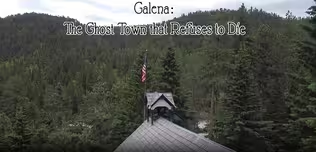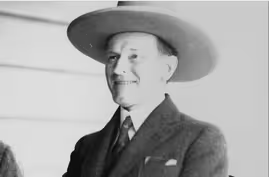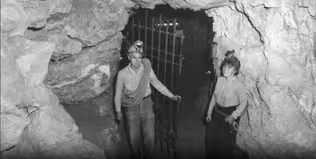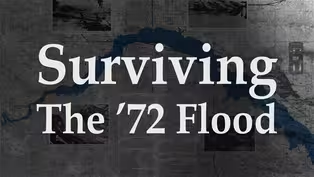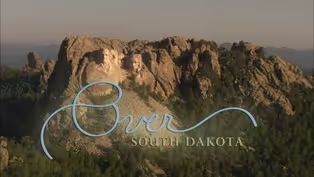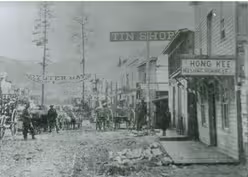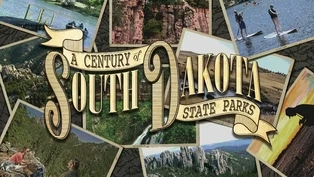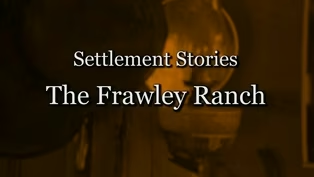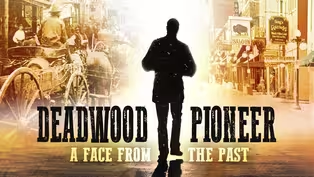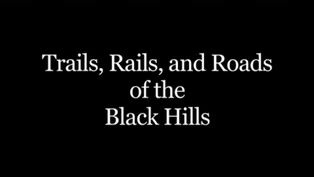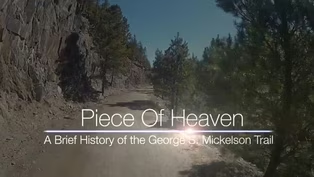SDPB Documentaries
Badger Clark: Poet Among the Pines
Special | 55m 45sVideo has Closed Captions
South Dakota’s first Poet Laureate defined the spirit of the Old West in his poetry.
With interviews, captivating imagery, and heartfelt readings of his timeless verses, this film paints a vivid portrait of a man who immortalized the spirit of the Old West through his poetic legacy.
Problems playing video? | Closed Captioning Feedback
Problems playing video? | Closed Captioning Feedback
SDPB Documentaries is a local public television program presented by SDPB
Support SDPB with a gift to the Friends of South Dakota Public Broadcasting
SDPB Documentaries
Badger Clark: Poet Among the Pines
Special | 55m 45sVideo has Closed Captions
With interviews, captivating imagery, and heartfelt readings of his timeless verses, this film paints a vivid portrait of a man who immortalized the spirit of the Old West through his poetic legacy.
Problems playing video? | Closed Captioning Feedback
How to Watch SDPB Documentaries
SDPB Documentaries is available to stream on pbs.org and the free PBS App, available on iPhone, Apple TV, Android TV, Android smartphones, Amazon Fire TV, Amazon Fire Tablet, Roku, Samsung Smart TV, and Vizio.
More from This Collection
Stories of the Black Hills and Badlands of South Dakota
Galena: The Ghost Town that Refuses to Die
Video has Closed Captions
The spirit of the residents of Galena, SD is the reason it’s a “ghost town that refuses to die.” (24m 37s)
Coolidge: Rediscovering an American President
Video has Closed Captions
A century after taking the oath of office, the presidency of Calvin Coolidge is examined. (57m 10s)
The Ups and Downs of Herb and Jan Conn
Video has Closed Captions
Herb and Jan Conn are legendary Black Hills pioneers. (30m 2s)
Video has Closed Captions
Survivors of a deadly 1972 flood in Rapid City, South Dakota, tell their stories 50 years (56m 46s)
A breathtaking aerial look at South Dakota's landscape and points of interest. (56m 45s)
Deadwood's 'Days of '76' Parade and Rodeo
Video has Closed Captions
Documentary about Deadwood's annual celebration of it's frontier past. (26m 53s)
Video has Closed Captions
Four private collectors of historical images share a passion for South Dakota history. (28m 48s)
A Century of South Dakota State Parks
Video has Closed Captions
Celebrating the centennial year of the founding of South Dakota's State Park System (28m 47s)
Settlement Stories: The Frawley Ranch / Mennonite Settlement
Video has Closed Captions
Two stories from South Dakota's settlement days. (28m 55s)
Deadwood Pioneer: A Face From The Past
Video has Closed Captions
See how modern forensic technology helps puts a face on a 150 year old mystery. (53m 16s)
Trails, Rails, and Roads of the Black Hills
Video has Closed Captions
How transportation and infrastructure have evolved in the Black Hills and the region. (28m 49s)
Piece of Heaven - A Brief History of the Mickelson Trail
Video has Closed Captions
A history of the development of South Dakota's Mickelson Trail (29m 3s)
Providing Support for PBS.org
Learn Moreabout PBS online sponsorship(mid tempo music) - You are watching a production of South Dakota Public Broadcasting.
(mid tempo music) (effects whooshing) (gentle music) (seagulls squawking) - "I've got a date with the sky today, "The suns got into my veins.
"Soul, come on, let's loaf and play, "I've got a date with the sky today."
(gentle music) (seagulls squawking) - He saw beauty, he saw things to reflect on, at a time when there were just people holding on for survival.
He helped people see and appreciate that there's more to South Dakota than just a rough life.
(gentle music) - Free in one breath to laugh and play.
I've got a date with the sky today.
(gentle music) - Before he became known as Badger Clark, Cowboy Poet, he was a college dropout.
An early 20th century ranch hand, then a Cuban prisoner.
The legacy of the man born Charlie Clark Jr., though, is literature.
An entire genre of literature sparked by the poetry of a man whose verses are as timeless as the mountains he loved.
A writer who lived alone in the woods, pondering the rhythms of man and nature in the American West.
(gentle music) Through his enduring work, he paints vivid tapestries of nature's grace, immortalizes the ways of the old West, and captures the relentless trials that endured with him.
- Badger Clark is probably not only the godfather of cowboy poetry, but the godfather of South Dakota.
- His writings and poems stand up today, because they're relevant to being human, very relevant to being a human being on the face of this earth, before all of the other exterior things that involve your life and the complexities of life surround you.
Before all that, there's Badger Clark's writings.
(gentle music) (keyboard clicking) (gentle music) - Major funding for "Badger Clark Poet Among the Pines," is provided by the Badger Clark Foundation, in memory of R. Brooks Christenson.
- Donors to the Explore South Dakota Fund support the production of local documentaries and other programs of local interest, presented by SDPB.
Friends of SDPB appreciates their support of this program.
- Additional support for poet among the Pines is provided by Custer State Park, where Granite Peaks and the wide open prairie are calling.
Your adventure is awaiting among the Ponderosa Pines.
Custer State Park, open year round.
(gentle music) - Charles Badger Clark Jr. Was born on New Year's Day 1883 in Albion, Iowa, to Mary Ellen Clark and the Reverend Charles Clark, a Methodist minister who was wounded twice while serving with the Union Army during the Civil War.
- His father had been invilated out of the Civil War and never really recovered, and doctors had come up with different ways for him to have a longer life.
They advised him to become a farmer.
- When Charlie was three months old, the family joined the Dakota boom, homesteading near Plankinton, South Dakota.
When they weren't busting sod, they read literature, Dickens, Hugo, Tennyson and the Bible.
But it was the howling wind blowing across the prairie landscape that left an early impression.
(wind howling) - "It hissed through the shaken grasses, "Rushing and swung by, "Flailing the empty land "Under an empty sky.
"And I looked out the window, a boy of six or so, "Wondering where the wind came from, "And whether it all could go."
(gentle music) - They had a phrase for Charlie, he was the youngest, and so he had these two much older brothers, but they'd be sitting around the kitchen table or wherever in the house, and he'd pipe up to say something, and they'd say, "Hold everything.
"Listen to the voice of the wind, "for the man with the big ears speaks."
And this was a wonderful put down that he waited for.
He expected it.
- With his health improving, Reverend Clark gave up the Plankiton homestead and turned to the pulpit.
He ran a parish in nearby Mitchell, and was part of a group that helped to promote Dakota Wesleyan University.
It's where Charlie's older brother, Frederick attended college.
Fred was known as the brightest kid in the family, with a promising speaking career ahead of him.
But Frederick Clark died on August 23rd, 1894, of tuberculosis.
- He was going to do what his brother was doing, and his brother was already very successful in higher education.
And then to lose him like that, then that kinda left him without a rudder.
- Tuberculosis was terrifying.
If you got it, there was a very good chance you would not recover.
You might have to be isolated in a sanitarium.
And it was scary.
I mean, you had death staring you in the face.
There was no cure then.
And at the very best, you were probably gonna have to go away and be isolated with other patients in a special facility.
And everybody knew about it.
And if you knew he had been exposed, it's sort of like, "Well, when is it my turn?"
- His mother, who had been the caregiver for Fred for all those years, many years, not surprisingly, she too had consumption, and which is transmitted.
Think of the time she sat right next to her son as he was coughing directly on her.
And that is exactly the way this is transmitted.
And this was before antibiotics.
- After Mary Ellen was diagnosed with TB, Reverend Clark accepted a call to be the pastor for the Deadwood Methodist Church in the Black Hills.
- They moved to the Black Hills with the idea that the mountain air would prolong his dear wife's life.
And that was not to be.
- Mary Ellen died on October 7th, 1898 at the age of 54.
Charlie was 15 years old.
(machine whirring) Deadwood in the early 19 hundreds was a rough and wild town known for its lawlessness and gold rush.
- Deadwood had a lot of saloons, it had a lot of prostitution.
In some ways it was struggling.
It was still trying to find an identity for itself.
'Cause Lead is where the big gold mine was.
So it was a rough town, but he did, because of his father see a different side of Deadwood.
His father, when nobody else wanted to do it, conducted the funeral for calamity Jane.
- She was such a character that no church in town would give her a formal church burial.
They were gonna bury her in city hall.
And now that the reverend said, "No, I'm gonna give her a proper burial in my church."
- And that tells you something about the Clark family.
They were always looking for good.
They weren't judging, and even calamity Jane deserved a respectful funeral at the end.
- He was in terrific awe of his father.
Thought of him almost as a saint.
- Charlie attended and graduated from Deadwood High School.
There in the old mining town of the Black Hills, he found love.
Helen Fowler was a fellow classmate and the daughter of a Deadwood attorney.
They were quickly engaged.
- Helen's parents knew this young suitor.
And he's a son of a minister, a son of a preacher.
He has no job, his prospects are very slim.
And so, yes, they were not in favor of this.
- Helen would soon call off the engagement.
- I think Helen Fowler broke his heart, his old high school girlfriend, and I don't think he ever got over it.
- I think she was a very intelligent woman.
She was seeing what this young man needed and also how he needed to develop.
- In 1901, Charlie's father married Anna Rachel Morris, who was a school teacher, a member of the Women's Christian Temperance Union, and an amateur poet.
That fall Charlie attended Dakota Wesleyan University.
- Whereby God, his father helped to build that college.
And where his brother, Fred excelled.
Yes, there's no other direction, but he has to go to this school.
And he's diligent working through his freshman year.
And there are different stories about how it went wrong.
He had this habit of smoking and that got him in trouble.
And maybe that was the whole problem, but then there are other stories about where he was getting into some mischief and he brought a animal into a dormitory or somebody's office.
And I don't wanna say anything more about that because that's just conjecture, but he got into some trouble at the school, and then he's no longer going to Dakota Wesleyan.
(gentle music) Well after college, now he's at loose ends and he's probably not in good relations with his father, now.
(gentle music) You might say this is a desperate time for him to resolve something.
And then there's this adventure going on in Cuba.
- Wanting to be part of a grand adventure, he joined a Cuban bound colonization group that was based out of Mitchell.
- There are people that are being oppressed, and there are people that need help, and by golly, he's going to Cuba.
Seemed like a good out.
- So you took a bunch of farmers from the upper Midwest and said, "Hey, come here, we have this land.
"You can get a farm.
"We'll grow pineapples and oranges and stuff."
- The colonization effort failed within months.
While the rest of the colonizers hurried back to the United States, Charlie stayed and found a job working on a plantation.
One day, his employer shot and wounded a neighbor during a dispute while digging up pineapple plants.
- When all of a said and done, he was around when there was a non-fatal shooting.
And it wasn't him that pulled the trigger, he wasn't any of that, but he was incarcerated.
He did not endure, there was no beatings or torture or anything like that, and I'm sure he got to improve his Spanish.
And he said there were some other Americans that were incarcerated and they all sort lamented.
But eventually money was raised to bail him out.
- He was just in the wrong place at the wrong time.
And when they released him, they said, "Get outta town."
- He quickly returned to South Dakota and found a job working as a land surveyor in the Badlands.
But he soon developed a persistent cough and fell ill. - And he'd been going downhill for a long time and not complaining about it at all.
Somebody finally made him go to the doctor.
- He was diagnosed with tuberculosis.
Based on his family history with the disease, doctors advised he move to a warmer climate.
So in April of 1906, at the age of 23, Charlie moved to the desert.
He became a caretaker of the Cross Eye, quarter Circle Ranch outside Tombstone, Arizona.
- It was absolute, as far as I can tell, it was absolute just pure luck that he met somebody, who introduced him to the Kendall Brothers.
And they needed somebody, they couldn't pay him, but they could feed him and give him a place to stay for free.
And their only question when they interviewed him was, "Do you have a saddle?
"No," "Get one."
So he went and bought a saddle, took him out to the ranch.
And on May 1st in 1906, he was now a cowboy caretaker.
(mid tempo country music) - To the North and East, rose the dragon Mountains, a landscape that reminded him of his place in the universe, the beauty and power of the natural world, and of the infinite possibilities that exist within it.
His nearest neighbor lived seven miles away.
(mid tempo country music) Any symptoms of Charlie's tuberculosis disappeared within six months.
- He arrived there, insecure, unsure of what his future was like.
Was he gonna die alone in this old Adobe house?
I mean, that was obviously had to be somewhere in his...
But he's feeling better every day, and all of a sudden he's feeling great.
So he wants to reassure his parents that he's feeling fine.
(mid tempo country music) - He was so enamored with the whole thing about Arizona cowboy culture, cows.
(gentle music) He couldn't contain himself.
And he wrote a poem about it, sent it to his stepmother, and she sent it to a magazine and they published it.
And he was just gobsmacked.
- The poem was called "Ridin'."
"Sunset Magazine" published it in July of 1903 and sent him a check for $10.
(gentle music) - "There is some that like the city "Grass that's curried smooth and green, "Theaytres and stranglin' collars, "Wagons run by gasoline, "But for me it's hawse and saddle, "Every day without a change, "And a desert sun a-blazin' "on a hundred miles of range.
"Just a-ridin', a-ridin' "I don't envy anyone when I'm ridin'."
(gentle music) - "I don't need no art exhibits "When the sunset does her best, "Paintin' everlastin' glory "On the mountains to the West."
(gentle music) - The subject is freedom.
(gentle music) That you have work to do, you have responsibilities, but you can be out and you can ride for miles and hours and not encounter a fence or even another person.
And it was just the wide open spaces.
And hat's what" Ridin'" seems to be about.
- That's what give him fuel for poetry.
And that's what cowboy poetry is, really is recording history through verse.
- "And your oprey looks foolish, "When the night bird starts his tune, "And the desert silver mounted by the touches of the moon."
(gentle music) - And so he's not only describing the place, and the dust devils and these other things, and in the very end, the last verse, he goes, "Ridin', ridin' "Nothin' I'd like half so well "As a-roundin' up the sinners "That have wandered out of Hell "And a-ridin'."
(gentle music) He also apologized to his father for having used the word hell.
He couldn't think of any other way for a man was writing and metered first.
He goes, "Nothin' I'd like half so well "As a-roundin' up the sinners "That have wandered out of Hell," and you go, "Well, what was he gonna say, Hades?"
No, that's two syllables.
He needed a one syllable for it.
And I can't imagine a grown man writing his father apologizing for having used the word hell.
- He must have looked at it and said, "Well, here's this guy from Arizona with South Dakota roots "can really write poetry."
And I think it really meant a lot to him.
(chuckling) He said, "Shoot, if I can get paid to do this, "I'm gonna do it."
(gentle music) - He'd spend the next four years riding horses, caring for cattle and penning poetic verses on the mundane routine of toiling on the unbound landscape.
- "'Twas good to live when all the sod, "Without no fence or fuss, "Belonged in partnership to God, "The Gover'ment and us.
"With skyline bounds from east to west "And room to go and come, "I loved my fellow man the best "When he was scattered some.
(gentle music) - "I loved my fellow man the best "When he was scattered some."
That just gets right to the heart of me.
It's good when you can have some space around you.
- A lot of his poems are just about the day-to-day struggles of just meeting the challenges of everyday life and the challenges presented by other people and trying to discipline yourself, trying to have focus and trying to... You know what you want to happen, but it's a struggle to get from there to there.
(gentle music) (crickets chirping) - "When my trail stretches out to the edge of the sky "Through the desert so empty and bright, "When I'm watchin' the miles as they go crawlin' by "And a-hopin' I'll get there by night."
- I think he was writing for a world that looked upon cowboys as inferior laborers sort of surfs.
And he wanted the world to know that they're smarter than that, and valuable human beings.
Even if they don't do anything but the labor that the rest of us don't want to do, they are so valuable, and we often paint, "Oh, that's just somebody, "some poor schmuck that never got an education "and is working."
(gentle music) - You know, I say he was a ranch sitter.
The owners would be out working with cattle, and he was there to tend to the fences, tend to the animals there, whatever needs to be done.
And then sometimes passers by would come by and he would take care of their needs, but most of the time he was alone.
And that seemed to suit him just fine.
And he would, in the evenings when all the work was done, he'd go and sit out on the porch, and get out his guitar and sing to the stars in the Dragoon mountain.
- He would write something and then he would play a little bit of it on his guitar just to see if it had the right meter to it.
Because a lot of times poets will write and their lines will extend off the page, and you really can't bring it together and put it into music very easily.
(gentle music) - One day his stepmother encouraged him to write a poem reflecting a cowboy's religion.
(gentle music) - And he replied that he didn't have any experience with cowboys praying.
They would sometimes use words that you would find in the Bible, but they were not in a prayerful spirit.
But his mother persisted.
And so he wrote a poem about a cowboy's prayer.
- One of my favorite lines that he ever wrote was, "Oh Lord, I've never lived where churches grow."
What a fantastic line that is.
(gentle music) - "Oh Lord, I've never lived where churches grow.
"I love creation better as it stood "That day You finished it so long ago "And looked upon Your work and called it good."
(gentle music) - "I know that others find You in the light "That's sifted down through tinted window panes, "And yet I seem to feel You near tonight "In this dim, quiet starlight on the plains."
(gentle music) Yes, who doesn't feel that?
You look up into the stars and you see the great infinity, and, you get that.
(gentle music) - He felt all the spiritual, the Christian stuff in a setting that wasn't in a church.
And I think those are really courageous things for him to say.
(gentle music) - "Let me be easy on the man that's down; "Let me be square and generous with all.
"I'm careless sometimes, Lord, when I'm in town, "But never let 'em say I'm mean or small!"
(gentle music) - I think part of it is his upbringing from his father that gives him a connection to the Lord above and the connection to the nature around him and his place in all of this.
And I think what he's giving is a pretty honest assessment of himself as well as the world around him.
And I think that anyone can see themselves in this poem.
- "I thank You, Lord, that I am placed so well, "That You have made my freedom so complete; "That I'm no slave of whistle, clock or bell, "Nor weak-eyed prisoner of wall and street.
He appreciated it, and I think other people said, "well, I, "maybe I could live out "for going out in the desert or something."
(gentle music) - Of the 62 published poems he wrote in the Arizona Desert, none has as much far reaching popularity as "A Cowboy's Prayer."
(gentle music) - It was written years ago.
There's hardly a rodeo that they don't recite it and funerals.
(gentle music) I used to play the organ for rodeos, and I played for a lot of funerals, and I've heard it many times.
Old ranchers, old cowboys, they always want that at their funeral because it's cowboy, but yet it's a wonderful prayer really.
(gentle music) (gentle music) - One day while reading a newspaper, Charlie's attention was caught by a quote from President Woodrow Wilson, who stated, "An individual who desires to distinguish themselves "should possess an uncommon first name."
Spurred by the president's insight, Charlie adopted his middle name Badger as his new identity and signature for his poetry.
- Well, Charles Badger Clark Jr. Was named for his father.
(gentle music) And there came a time when he felt like he wanted to be able to distinguish himself as being his own person.
And he was getting some suggestions from the literary crowd that he needs to be able to find a way to stand out as well.
And so then he took on his father's mother's family name, Badger, and took that to be his handle.
This is who I am now.
- I think he was a great self-promoter.
I really do.
He had something inside him that said, "I can make this work."
I mean, the guy's a poet for crying out loud.
And that separated him, I guarantee you.
It separated him from any poet I've ever seen back then.
In a good way.
- I think he always saw himself as an outsider, an observer.
He never saw himself as a cowboy, for example.
He wasn't really handy with a rope, he wasn't really handy with working horses, but he was an observer.
And so he was there to observe this exotic place that he hadn't seen before.
And so I don't think he intended on making that his life.
- He didn't wanna come back.
He was already making money, selling poetry.
He could sell it from Arizona as well as anywhere else.
The reason he came back to South Dakota was his father's health was failing.
- He was devoted to his father.
And so he was coming back to help him through this difficult time.
- In 1910, Badger Clark moved in with his family in Hot Springs, South Dakota.
He'd spend the next decade devoting his life to his ailing father and his poetry.
(gentle music) - He's back in his home turf, he's back among his people and he is still an outsider.
He has been away for a while and things have changed and he has changed.
But he is back with his father and his stepmother and he adores them both.
And he continues to write, and his stepmother is encouraging him to publish.
And in fact, she gives him a loan to publish his first book, "Sun and Saddle Leather," 1915.
- "Sun and Saddle Leather" was so successful that he paid back his stepmother within a year on the royalties alone.
- I think Badger had no idea of the success of his book.
I think he was publishing it as an obligation that he should, but I don't think he expected the success that he achieved with it.
(gentle music) - I was going to Hermosa School, which like all other schools in the country, they threw a little poetry at you.
And it was people like Tennyson, and excellent, wonderful poets who had nothing to do with the life I was living.
I couldn't wait to get home, get on my horse and go out and ride.
And here was a man who understood about riding horses and who wrote about the plains, beautiful, beautiful lines that just seemed to stick in your mind.
"I dream no dreams of a nurse-maid state "That will spoon me out my food."
And that was the cowboy, the rancher philosophy as far as I was learning it.
"Life flutters high when you're lookin' to die; "And that is the fun of the hawse work."
(chuckling) "Yet when I sigh and the world is a lie "Give me a day on the hawse work."
I was so glad to get home from school, get on my horse, (chuckling) get away from school and civilization and dresses.
- It was a different time.
It's when just the general public, much more than they do today, read poetry, read fiction.
So if you did those forms well, you could acquire a national reputation, and he certainly did.
(gentle music) - With his growing popularity, he was often asked to recite his poetry at public events.
- And this was a horrifying idea.
Here is a fellow that enjoys his solitude and his innermost thoughts he keeps only on paper, but to go out before an audience and perform is something that he never imagined.
And it was a difficult wheel to get turning.
(gentle music) - He decided to grow a beard, and he chose, for some reason, the perfect look for a poet would be a Van Dyke, trimmed beard, carefully trimmed and so on.
He must have spent a lot of time on it.
So you could tell how he thought about it.
He began to caucus Stetson always to the side.
And that was, again, had a trademark rather than having it sit square on his head.
- It's like when you're an actor, you become a different person.
And so then you are free to do whatever it is that you wouldn't normally do.
And Badger does recreate himself.
He creates a uniform.
He's wearing almost a military uniform.
And I think that does give him some freedom to be a performer, as opposed to being a Badger Clark.
- I think it was part of the hip look, he had.
We're coming out of the Civil War and then the West and then the settlement, the Indian Wars, the Gun Slingers Wild Bill.
And then he's still kind of the tail end of this with the hat and the riding boots.
I think he was at the guy at the perfect time, I really do.
(gentle music) - He did a lot of campfire talks.
Being in the Black Hills, we had lots and lots of kids camps, girls Scouts, boy Scouts, you name it, at church camps.
And they would invite him to do an evening campfire talk.
And the word started to spread.
Then he started getting requests for graduations.
He used to call it his hot air circuit.
Every spring, he was just on the road all the time.
(gentle music) - You know, I think if you were a child who Badger Clark came to your school, you remembered that experience because you were really meeting somebody who was a celebrity.
- He used to be a superstar in South Dakota.
Everybody knew Badger Clark.
And when you see these women from Custer that remembered him coming into town to shop, and their eyes would just light up.
Their whole bodies would light up, 'cause he was such a great person.
- He got paid a pittance, I think, for some of his appearances.
But people asked him to speak all over the state, probably all over the country, at high school graduations and stuff.
And he remarked sometimes that, "they invite me to go to Aberdeen, "and they say, 'Well, thank you very much Mr. Clark,' "when it's done, and that's it."
- Then he started really traveling when he joined the Chautauqua circuit, a huge impact on his life.
- He joined the National Red Path Chautauqua, a traveling tent show that set out to entertain and inspire rural communities.
For many small towns across the country, the Red Path Chautauqua was a window to the wider world and a chance to connect with a community that shared a thirst for knowledge and a love of entertainment.
- He had met some famous people out on the Chautauqua circuit,, and he was not impressed, because he felt that some of them were just slaves to these, they were hounded by people all the time.
They were hounded by requests, demands.
And he felt that these people were not their own person anymore.
And it turned him off.
He stayed with it for a while because of the money.
And then he finally just thought, "The Black Hills are beckoning, "I'm just gonna go home."
(gentle music) - "The shadows lengthen to the east, (gentle music) "The latter miles are slowly scored, (gentle music) "And ere the long day's work has ceased "You ask of profits and reward."
(gentle music) - On June 10th, 1921, the Reverend Charles Sr. died at the age of 82.
After his stepmother retired to the State Soldier's Home, Badger sought the solitude of the new Custer State Park, renting a one room 10 by 12 foot cabin.
He would spend the rest of his years connecting with nature and writing poetry and essays.
- I think Badger Clark, when he got out to the hills, saw the uniqueness of Custer State Park and wanted to make this his home.
And at that time, it was possible, we were renting out and leasing out cabins for people to make their summer cabins.
And I think Badger saw that opportunity and knew this was gonna be his place, this is where he could connect and do his writing, and kind of escape, and knew it was his spot.
- He came back directly back to the Black Hills, which is where he'd grown up.
(gentle music) I think that Black Hills are mystic.
(gentle music) The Rocky Mountains, for example, are majestic.
The Black Hills are mystic.
(gentle music) They're the oldest mountains in the world.
(gentle music) They have a sense and the feel, like they're alive.
And I think maybe he derived a lot of his poetry from that sense that he got from the Black Hills, that feeling.
(gentle music) - He just, I think spent a lot of time observing.
So he's living near the base of a mountain in his cabin, and every day he's gonna see deer.
The deer would come right up on his porch, and look in the windows, he would see birds, the wild flowers he wrote about quite a bit.
So for him, I think the Black Hills represented his muse.
(gentle music) - Badger publishes a second book, which is "Grass Grown Trails."
He's continuing to write about his experiences in Arizona, but he's also adding some material from living up here in the hills and up among the wild creatures.
And so he is adding some of that material as well.
- He loved the animals.
He fed the deer pancakes.
He knew the deer by names that he gave them.
So he was immersed fully in into the landscape, the incredible landscape of the Black Hills.
Yet at the same time, he was a social person.
He would go out and give talks all the time.
Anytime it seemed like a building was being dedicated, you could count on Badger Clark being interested in coming and being part of that ceremony.
So he had two worlds, that hidden away in the Black Hills, but also going out and meeting its public.
And I think meeting children especially, he was a big, big figure to them.
(gentle music) - Pretty impressive figure.
He was a pretty big man.
I think he stood over six feet, and he had that almost military uniform (chuckling) he wore, he was pretty impressive to look at, intimidating.
And, (gentle music) he asked me how old I was, and I told him I was 15.
He said, "Did you go to high school?"
I said, "No, I went through the eighth grade "and that was it."
He said, "Well, we're gonna fix that."
I said, "How?"
He said, I'm gonna have you read some books.
He started me off on three of Shakespeare's plays, and then I had to give him a written report.
I was terrified of the man.
(gentle music) He would pick out some chapter in that book and ask me what I thought it meant.
Well, I didn't know what the hell it meant, but I paid more attention to what I read after that, because he would do that.
He knew all of those books.
He caused me to think.
You don't know how to think, 'till you learn how to think.
And it helped me all the rest of my life.
I didn't realize it for a long time.
- I used to go over there when I was a little kid and slay on his hill.
He had a good hill for sledding.
And I'd be out there slaying sledding, and he'd come out on the porch and he'd say, "Kenny, come on in here, "I got some hot chocolate."
They'd stand over there and he'd read his latest poem.
And then whether good or bad, I didn't know.
But I always thought if that was the best poem in the world, 'cause I want another hot chocolate.
(mid tempo music) - During the summer of 1927, President Calvin Coolidge, spent a three month working vacation in Custer State Park.
(mid tempo music) - The Custer State Game Lodge was the summer White House.
They put a library in there and they put "Sun and Saddle Leather" in there.
And Mrs. Coolidge saw that she kinda liked it.
This guy's a hip, hip guy, Badger Clark.
They went down to Hot Springs to dedicate the veteran's home.
The ladies of the town had a tee for the president, and the president asked 'em, "Where's the cowboy poet?
"Where's Badger?"
- That's a very embarrassing story.
When Calvin Coolidge knew who Badger Clark was, and yet he had not been invited to the ceremonies down in Hot Springs.
And I don't know if Badger Clark realized this at the time, but he was summoned immediately.
Somebody drove up from Hot Springs to pick him up and said, "The president wants to meet you."
And he quick pulled himself together and went down.
(gentle music) - Well Badger upon the death of his stepmother, he received an inheritance that allowed him to build a place of his own, his dream house, you might say.
And he builds a cabin up in the Black Hills, again, he calls it his Badger Hole.
And it took years to complete it.
(gentle music) - My dad was a plumber, a carpenter, and he was a really good stone mason.
So he did the work on Badger Clark's fireplace in the front of his porch there.
And Badger Clark wanted to have a roof on his porch, but there was a big tree there.
So Dad said, you have to cut that tree down.
Well, Badger didn't wanna cut that tree down.
So dad went ahead and built the porch and he cut a big hole in the porch roof so that pine tree can grow up through it.
(gentle music) - Those rocks are handpicked that make the foundation.
The wood is handpicked, the colors, he picked, the layout of the cabin.
He had two rooms in there by the fire where it's warm.
He had the kitchen set up, I think viewing the old growth forest there.
And then just a big living room to handle all his books, to do his writing.
- He wanted to live a simple life, getting down to the basics.
He wasn't so far away from the pioneer years, and he just kind of figured he wasn't gonna become a rich man as a poet, or even as a very successful speaker on the Chautauqua circuit.
He thought, what would I do with all this money?
So he lived a very simple life.
He was happy with it.
- And he does not have electricity, does not have running water, and these are by choice.
He is content to live in the old way (water dripping) to carry water from the creek.
There's a privy out in the backyard and that serves his needs.
- He didn't have a phone.
Somebody could try and get all the way out to his cabin, but the roads were not good.
And I guess you could get there on a horse easily, but he wouldn't have had very much interruption from human beings, which are the most demanding distractions.
He didn't have a wife, he didn't have children, he didn't have those distractions.
But the distractions he had were, if he got stuck writing, put his boots on and go for a walk, and maybe something would loosen up his thoughts, something he observed.
So I think it was a very healthy environment for him as far as being a writer.
(gentle music) - Well, all through Badger's life, it seems that people observed him as, shall we say, an odd duck, an outsider?
Someone who was not like they are.
(gentle music) That was him all through his life.
(gentle music) - He would learn to be frugal, but he didn't think of it as squalor, it was his choice.
And he would trade any amount of money to be able to live the life that he had, especially with a new house.
It was just wonderful.
(gentle pipe music) - "Another year grows calmly old, "And frost is on the morning grass.
"The quaking, aspens shed, its gold, "The mountain lake lies as still as glass."
(gentle music) In 1937 South Dakota Governor Leslie Jensen named Badger at the state's first poet laureate.
It was one of the few honors bestowed on Badger, as he didn't seek out awards and fame.
He had no agent or publisher.
- Badger took it in stride, humbly as he always would do.
And he also liked to refer to himself as the poet laureate.
- I never heard Charlie ever tell anybody in front of me or talk about being South Dakota's first poet laureate.
He really had mixed feelings about it.
For one thing, the governor was a good friend of his, they were neighbors in Hot Springs.
He just didn't really see a need, I guess.
(chuckling) And people did make a big deal about it.
(gentle music) - We were aware that Badger Clark was the Laureate.
And it was kind of a...
It wasn't a joke, because it was a esteemed title, but he didn't make very much money off of being South Dakota's poet.
And we have a book that I don't know was ever printed at length, but it's a book of letters that he wrote.
And almost every letter in there, he complains about how poor and destitute he is.
And he's asking people, "Do you have a couple extra bucks?"
- He never had a car.
And I think there's kind of a legend of Badger Clark.
He was walking everywhere.
I hear people say, Well, he was out in the Custer Park, if he had to get some food items or something, he walked into Custer.
But he was somebody people would always pick up when he was out on the road, and they'd give him a ride.
- And he dressed so differently, dressed like a cowboy, but a very well dressed cowboy.
He was always recognizable.
And any anybody in the county or Custer State Park knew him.
He would only get a few steps along, somebody come and pick him up.
Same thing, he'd get his supplies in Custer, head on back, and there'd be somebody who'd recognize him, or he just looked like such a friendly fella.
And he would entertain them in the car even if he didn't know them.
♪ Desert blue and silver in the still moonshine ♪ - One afternoon while waiting for a train, he walked into a movie theater, and was surprised to see Bing Crosby sing his poem "A Roundup Lullaby," from the western musical, "Rhythm on The Range."
♪ Far sky line, ♪ ♪ Time for millin' cattle to be still ♪ - Now, this was back in the day when people bought sheet music after they saw the movie, but he didn't get any proceeds from that.
He probably could have made a significant amount of money if he had bothered to copyright the poems and music that he wrote, but he was a little sloppy about that.
So some of his things got claimed by others.
And some of them, even today, you'll say this is an old cowboy folk song, but it's really something that Badger Clark composed.
So he resented it when people plagiarized his work, but on the other hand, he didn't get obsessed by it or embittered by it.
He just kept going.
- Badger continued to write.
He published a book of short stories about his time in Arizona, another book of poetry and the history book commissioned by the Kiwanis Club of Hot Springs, (gentle music) along with a growing pile of correspondence from all over the world.
(gentle music) - He was completely unique as a human being.
He could live in an environment with nothing to speak of around him, and draw people to him because of his character.
(gentle music) And people really strove to be with the man.
He was dynamic.
(gentle music) He must have had a personality that was almost magnetic.
(gentle music) - "When I shall top the last divide "And journey down the other side, "What vested here on earth will be "To prove that there was once a me."
(gentle music) - In the morning, Badger Clark used to come out and he used to lean over the porch, railing on his porch, and just cough and cough and cough.
You could hear that from mile away, and apparently due to his respiratory disease, but that's wasn't a good indication that he was healthy, but he never complained to us about it, never asked us for an aspirin.
(chuckling) (gentle music) - He knew he was dying, even though the doctor didn't, he did.
(gentle music) If he was in a lot of pain and had problems, he wasn't letting anybody know.
(gentle music) - In early September of 1957, Badger was diagnosed with lung and throat cancer.
A month later, he passed away peacefully at the age of 74.
(somber music) - When Badger was gone, his funeral was very well attended.
Again, being for such a loner, such a hermit, for so many to come to honor him was quite a contrast.
(somber music) - I was there at the funeral.
I was only 10, and my memories are, I was mostly in awe.
There were a lot of people there.
They were famous people, they were important people.
A lot of South Dakota legislators.
The governor was there.
A real show of support and respect for the first poet Laureate of South Dakota.
And it wasn't just respect, it was love, it was palpable.
And I was impressed.
(somber music) - "I dread the break when I shall die "Not from my human friends, for they "Are shifting shadows such as I "And soon must follow me away "But from my earth that still must swing "From day to dusk, from dark to dawn, "Slow shimmering on from spring to spring "Through all the years when I am gone."
(somber music) In the decades since his death, Badger Clark, the reclusive poet of nature, has become a fixture in South Dakota history.
His cabin preserved since his time, houses his boots on the floor and his typewriter on the desk.
Each year, thousands of visitors explore the cabin and traverse the same wilderness trails he cherished.
Notably Bob Dylan and other musicians recorded his poems and turned them into songs.
The South Dakota State Historical Society Foundation, ensures his poetry books stay in circulation, while annual community gatherings unite admirers and companions in celebration of the secluded poet.
♪ But then I used to love ♪ (gentle music) - I think Badger Clark's legacy is living a true life and living a simple life, but being true to your heart, and not giving up, creating more, even though there's no profit in it.
(gentle music) - He lived a very simple life, a life he wanted to live out in the woods, in a cabin he built doing something he loves.
And he was okay with that.
And that's okay.
And I think sometimes people forget it's okay to do that.
You don't have to live up to the standards of society because who knows, you may be making big footprints that will make history and people will talk about you after that.
- He was a cowboy poet before there was such a thing as cowboy poets.
I mean, he helped invent the genre.
- I really feel like Badger Clark is the godfather of cowboy poetry, because he not only lived the life and wrote it in such excellent form, but he is modeled after, it's timeless.
(mid tempo music) - And I think he defines the success of what people think a famous historical character should be.
He didn't do shootouts like Wild Bill Haga did.
He didn't blaze the trail across the prairie.
He was a poetry writer in the middle of a state park.
But yet here he is and we're still talking about him.
- Well, he was an exceptional human being.
I've known a few of those in my life, and they just stand out and they influence other people's lives to a great degree.
And they leave the world a better place.
(mid tempo music)
Support for PBS provided by:
SDPB Documentaries is a local public television program presented by SDPB
Support SDPB with a gift to the Friends of South Dakota Public Broadcasting
